Russ Wise provides a good understanding of why people are attracted to a negative sounding practice: the worship of Satan. Looking at this issue from a biblical worldview, he presents information on how God can free people who have bought into this lie. From a Christian perspective, we don’t need to fear them but instead stand ready to offer them the deliverance found only in Jesus Christ.
[Webservant’s Note: Since this article was written in 1994, a “new face” of Satanism has emerged, consisting of pagans and atheists who claim to not believe in Satan yet who have appropriated the name “Satanist” for themselves. Many of these young “neo-Satanists” (to coin a phrase) deny the concepts of good and evil, worship themselves, and take great offense at articles like this that describe a Satanic-oriented description of their chosen set of beliefs.
Nonetheless, we believe Russ Wise’s original article is still worth offering because of the high numbers of people drawn into the openly occult practices described herein.]
The Growing Problem
The occult is on the rise; many young people are seeking their spiritual identity through Satanism.
Satanism has become an issue of great concern in our society. It is a phenomena that crosses the city limits into the rural areas of our nation. Satanism is not just a big city problem. The news wires carry story after story about young children being kidnapped, only to be found later as victims of some bizarre ritualistic crime. To help us gain a balanced perspective of the subject, C. S. Lewis in his book Screwtape Letters, says this about Satan:
There are two equal and opposite errors into which our race can fall about the devils. One is to disbelieve in their existence. The other is to believe and to feel an unhealthy interest in them. They themselves are equally pleased by both errors and hail a materialist or a magician with the same delight.
As satanic involvement among our youth increases, we begin to see the primary goal of such activity. It has become clear, according to the data thus far analyzed by those who investigate satanic involvement, that the primary goal is to alter people’s values and turn them against themselves, their beliefs, family, God, and society.
When we begin to take a close look at the occult, it becomes necessary to define terms. There is a great difference between cults and the occult. The term cult refers to a group of people polarized around one individual who is often a magnetic personality. This individual has his or her own understanding of truth, who God is, man’s relationship to God, the existence of heaven and hell, as well as a number of other issues of faith. In most cases such individuals incorporate some degree of biblical truth into their teachings in order to gain a certain amount of credibility and in order to deceive the unwary.
The term occult means “hidden” or those things or teachings that are “unknown” or secret. So, the occult is the seeking after knowledge of unknown information, knowledge that is gained beyond the five senses. Therefore, knowledge is received by some supernatural involvement or connection.
Anton LaVey of the First Church of Satan in San Francisco, California, says that
Satanism is a blatantly selfish, brutal religion. It is based on the belief that man is inherently a selfish, violent creature… that the earth will be ruled by those who fight to win.
Satanism challenges the biblical teaching regarding man’s relationship to others. We are to esteem others better than ourselves, and we are to be team players. In 1 Corinthians we read about being a part of the body of Christ, whereas, Satanism esteems the “self” over others.
Young satanists believe that the strong will rule with Satan. Once they are sufficiently involved, they often make a pact with Satan. They commit themselves to a future date when they will take their own lives by suicide. They believe that if they submit themselves to Satan in death, they will come back in another life as a stronger being and rule with him forever. According to recent statistics, fourteen young people a day take their own lives. A major concern for those who uphold a Judeo-Christian worldview is that this generation is becoming detached and is losing all sense of morality. Many have lost their mooring. It is imperative for the church, as a corporate body, and we as individuals, to share the message that Jesus Christ is the only possible solution to our emotional and spiritual needs.
The Power that Entices
Power has become an obsession with young satanists. It is sought after on the physical, mental, and spiritual levels. According to one former occultist, the greatest lure into the occult is “power” and “knowledge.” Not just corporate power but personal power. Gaining knowledge that others do not possess is another aspect of the occult. When an individuals have more knowledge it affords them a degree of power over those who do not have access to that knowledge.
Likewise, Satanism offers its lure to the youth in our society. Drugs and sex have become the bait that so often ensnare the unsuspecting.
With the increase of satanic activity, a profile of those involved in Satanism has emerged. They are generally from a white, middle to upper-middle class family. In most cases they are bright and do well in school; however, they are often bored and are not challenged to meet their full potential. They tend to have a low self-worth and are unable to distinguish between right and wrong because of their relative ethical system. They often have problems in the home and in relating to other people around them. They use drugs and are sexually promiscuous. It is a rare occasion when these last two elements are not present in the mix.
Abuse, both physically and emotionally, is another aspect of this mix. Young satanists are often abused children who know no other way to relate to people. Some are a part of a multi- generational family involved in worshiping Satan as savior.
Anton LaVey, Satanist High Priest of the First Church of Satan in San Francisco gives us a glimpse of how Satan is seen in his book The Satanic Bible:
We hold Satan as a symbolic personal savior, who takes care of mundane, fleshly, carnal things.
Satan has attempted to usurp the place of Christ in redeeming mankind. He has endeavored to establish himself as a god who is equal to or greater than Jehovah and in a sense render God ineffective. LaVey goes on to say that “God exists as a universal force, a balancing factor in nature, too impersonal to care one whit whether we live or die.”
Therefore, the Judeo-Christian God is inaccessible and has no compassion. Thus, Satan becomes the solution to man’s deepest needs.
Satanism leads one into bondage through mind control and fear, whereas Christianity allows the individual the freedom of choice. We have the opportunity to either accept God’s free gift of life or reject Him and simply exist separate from God’s love.
An Agent of Change
Music has always been at the center of the youth culture. The problem arises when the lyrics promote aberrant behavior. The Night Stalker, Richard Ramirez of Los Angeles, believed that Satan made him invincible. Police say the style of the brutal rapes and 16 murders Ramirez committed resembled the lyrics of the song “Night Prowler” on AC/DC’s LP “Highway to Hell.”
Along with Ramirez’ fascination with AC/DC, he used cocaine and PCP in conjunction with a deep interest in Satan worship. He believed that Satan would protect him and not allow harm to come to him. According to a People magazine article as long ago as September 1985,
Rock ‘n roll is turning too often to sex, Satanism, drugs and violence for its major themes and corrupting the values and views of unwary young people.
The lyrics of the last few years of the 1980s have continued on a downward slope. Rachel Matthews, an artist and repertoire representative for Capitol Records, recruits new groups for her company. Her comments regarding a newly signed band reveal what she, as one individual representing the music industry, is looking for in a band:
I was just going, ‘Oh (expletive)! I’ve never heard anything like this!’ I’ve heard plenty of metal and speed metal, but it was just so intense and out of control, just like this caged psychosis going on. I loved it, because you could actually understand the lyrics. And even if they’re morbid and gruesome, it’s really cool that you could understand what they’re saying. It just makes it twice as evil. I like that.” (Dallas Life Magazine, 1 July 1988)
The demo that interested Ms. Matthews in the group contained songs like “Die in Pain” and “Foaming at the Mouth.”
The music that causes the greatest concern is the various types of “metal” music. Metal has been classified into three types. First, is party metal, and it represents the most popular style of music. Groups like Bon Jovi, Motley Crue, and Def Leppard are representative of party metal. They tend to glorify sexuality and the party spirit.
The second type is “thrash metal” represented by groups like Metallica, Anthrax, and Megadeth. The primary focus of “thrash metal” is violence and death.
The third type is known as “black metal” and is overtly satanic. The lyrics encourage such activities as incest, necrophilia, rape, torture, and human sacrifice. Black metal is represented by groups like Venom and Slayer.
King Diamond is perhaps the most satanic of all “black metal” groups. He openly professes Satan and incorporates a large amount of satanic activity into his performances.
Music has always been an agent of change in our society. It tends to shape the moral attitudes of each generation. As Christians we should be especially concerned about the lyrics in the music of the youth culture. We cannot afford to allow another generation to become polluted with the immoral themes found in today’s music. As parents it is imperative that we maintain open communication lines with our young people. Without open communication it becomes improbable that we can affect the listening habits of our children. Second, we cannot be hypocritical in our personal listening habits. Third, we need to become familiar with the type of music our children listen to and be willing to acknowledge the good and be prepared to positively criticize that which is not appropriate within our household.
Last, we as parents need to recognize that if our child is involved in rebellious music, we must attempt to understand what unmet need in his life is being met by his musical diet.
Galatians 5:19-21 says that
The deeds of the flesh are evident, which are: immorality, sensuality, idolatry, sorcery . . . those who practice such things shall not inherit the Kingdom of God.
Therefore, it is imperative for us as adults and youth to only listen to and think upon those lyrics that would honor God and His principles.
The Games of Destruction
Satan has used a number of tools over the centuries to ensnare the naive. The Ouija Board has proven to be particularly useful. According to the Dictionary of Mysticism the Ouija Board is “an instrument for communication with the spirits of the dead.” The Ouija Board is an open door into the world of the occult and demonic activity. Disembodied spirits speak to the living through the medium of the Ouija Board. This information is believed to be truth from the other side and is not recognized for what it is: Lucifer’s delusion to gain our allegiance.
Jane Roberts, the author of The Seth Material, relates her story regarding the Ouija Board. She was about to write a book on ESP, and to stimulate her thoughts, she and her husband used a Ouija Board to gain perspective. After a few sessions they were able to receive messages from someone who later identified himself as Seth. The use of the Ouija Board and the gradual, but ever-growing, influence of Seth in Jane’s life brought her to the point of possession. Her mind would enter a trance state and a deep male voice would begin to speak, indicating he had a message to get across to our world the wisdom that it was only now ready for. Over a period of ten years Seth produced through Jane over 5000 typewritten records of alleged higher esoteric truth. Then Seth tried to kill her. Though she had not previously believed in demons, this experience changed her mind.
Internationally-known observer of the occult, Kurt Koch, says that by the use of the Ouija Board revelations from the past and predictions about the future are made.
Edmond Gruss tells us in his book Cults and the Occult in the Age of Aquarius that there have been “many cases of ‘possession’ after a period of Ouija Board use.” Supernatural contact is commonly made through use of the board and has become a primary tool of Satan in reaching young people.
The Rev. Donald Page of the Christian Spiritualist Church reports that most possession cases he has dealt with are people who have used the Ouija Board. Francoise Strachan’s book, A Company of Devils, states that the Ouija Board is “one of the easiest and quickest ways to become possessed.”
The greatest danger of the Ouija Board is that an individual begins to place his trust and future hope in the message the board brings. As a Christian our only source of revelation regarding future things is to be God’s Word. We are to look to Jesus Christ and His teachings to properly understand our problems and seek a solution. Deuteronomy 18 tells us to beware of mediums and those who practice divination.
1 Chronicles 10 tells the story of Saul who was unfaithful to the Lord and consulted a medium, seeking guidance and did not seek guidance from the Lord. Therefore, the Lord slew him and turned the Kingdom over to David.
Christians can offer several reasons as to why one should not be involved in the use of the Ouija Board. One is simply that the Bible condemns it as being involvement in the occult (Leviticus 19:31, 20:6). Another relates to the tragic experiences of those who have been involved with this medium. And then there’s the fact that the messages received are often false and misleading. They are often obscene and contrary to biblical teaching.
The following passages in Scripture give us, and those who would seek God’s perspective, where to go for truth.
“And when they shall say unto you, seek unto them that have familiar spirits and into wizards . . . should not a people seek unto their God?” (Isaiah 8:19)
“If any of you lack wisdom, let him ask of God, that giveth to all men liberally, . . . and it shall be given him.” (James 1:5)
The Great Delivery
God is able to deliver those who seek Him. Victory is ours. But first, we must receive God’s power.
We have been discussing the problems of satanic involvement. Whether we become deceived by use of the Ouija Board, music, divination or by Dungeons and Dragons, the end result is the same occult bondage.
Mark Bubeck’s Moody Press book, The Adversary, gives us a sound basis for applying sound biblical doctrine in resisting the devil as he attempts to infiltrate our lives. Basic to all victory of the believer over Satan is the absolute truth of biblical doctrine. There is no substitute. The greatest key in warfare against Satan is when we recognize that God’s truth is our only offense.
Bubeck refers to “doctrinal prayer” as an effective tool to use in spiritual warfare. The sixth chapter of Ephesians tells us that we do not wrestle against flesh and blood but against spiritual forces. We cannot effectively engage Satan in warfare on the natural plane; we must enter the spiritual dimension to adequately challenge Satan and defeat him and his host. According to Bubeck, doctrinal prayer
…is the practice of praying or applying the objective, absolute truths of the Word of God as the hope and basis of resolving our prayer burden.
Doctrinal prayer presupposes that we have a deep understanding of the Scriptures. Bible memorization is a must for this type of prayer.
Another aspect of our spiritual warfare is that of resistance. We are called to resist the devil. The term “resist” basically means to stand, to stand invincibly or successfully. We can stand firm and remain invincible because of the sacrifice Jesus made on the cross. Jesus was victorious over Satan at the cross. As God’s people, we are victorious over Satan because of Jesus. We can successfully resist Satan as we stand in right relationship with Christ. Since we are in Christ, and He has all authority in heaven and earth, we are in the only place of victory.
Ephesians 6 speaks of our spiritual armor. With the exception of the sword, this armor is defensive in nature. We have the victory; it has been won we simply need to stand our ground. Satan has been defeated at the cross (Colossians 2:8-15) and made powerless (Hebrews 2:14-15). The believer needs to stand in his rightful position in Christ as victor; Jesus has already won the battle.
The Holy Spirit of God shows us the way to righteousness and restoration. Satan attempts to convince us that we are so bad that God wouldn’t want anything to do with us. He seeks to convince us that there is no forgiveness for what we have done or that we have committed the unpardonable sin.
The Holy Spirit uses God’s Word to give us hope and assurance of God’s love and forgiveness, whereas Satan creates despair, doubt, resentment, and anger toward God, His Word, and His people. Satan intends for us to feel as though no one as bad as we are could ever really be saved.
Doctrine and right understanding is important to our spiritual welfare. It is the foundation upon which everything stands. Without it we are subject to every wind that blows, every false teaching that Satan would use to lure us.
As believers in the Lord Jesus Christ who have trusted in His blood atonement, we have a vast number of tools to render the enemy ineffective. Power, position, authority, total victory over Satan’s world belong to us. All that remains is for us to appropriate God’s promises and recognize our position in Christ, focus our attention against the devil’s work, and to rest in what our Lord has done for us.
Satanism is a growing concern in our culture. With this growth comes a great deal of confusion and a lack of understanding. The following information is designed to help you understand the problem by clearly defining the different aspects of the occult and giving you concise information that you can use.
Defining the Occult
Cult
A cult is a group of people polarized around an individual with a magnetic personality, who deviates from orthodox Christianity by distorting the central message of the Bible by additional revelation or by introducing their personal understanding of primary biblical doctrines such as the person of Jesus Christ, heaven, hell, salvation, atonement, the virgin birth, etc.
Occult
Secret or hidden knowledge. This knowledge is not discerned by the five senses and is therefore, supernaturally received through the practice of divination.
Witchcraft
The use of scripturally forbidden supernatural powers to manipulate people and events. Commonly known as the “craft of the wise” or “wicca,” the worship of nature and feminine energies mother nature. Witchcraft is manifested in two opposing views: white magic, and black magic or witchcraft (see Deuteronomy 18:10)
White Magic
The use of supernatural power to manipulate a person or an event to bring about good. The practice of divination is used to bring about “positive” results such as knowledge, healing, etc.
Black Magic
The use of supernatural power to manipulate a person or an event to bring about evil or destruction. Manipulation is achieved by use of rituals and the casting of spells.
Satanism
Unlike Witchcraft, Satanism is the worship of Satan, formerly known as Lucifer, and the practice of Black Magic. Satanism is a reaction against the Christian church and the Word of God in particular. Satanism promotes a do-what-you-want attitude and is ultimately the worship of oneself.
Categories of Involvement
Individuals involved in satanic activity fall into one of four categories:
• Multi-generational international organization
• National organizations
• Independent self-styled groups
• Individual dabblers
The greatest increase in involvement is among the latter group the dabbler. The dabbler is, in most cases, from a middle to upper- middle class, caucasian home and is a user of drugs and other controlled substances.
The larger concern is not in the number of young people involved in satanic activity but what they are capable of doing when they become absorbed in the worship of Satan.
Satanism centers around involvement in animal sacrifice, blood ritual, sex, the use of drugs and sometimes murder. According to “The Addiction Letter” (1/89),
Most Satanism revolves around a drug and alcohol dependent lifestyle which glorifies violence, hate, lying, stealing, and vandalism. The involved youngster craves a higher power to validate . . . chemical dependence and Satan fills the spiritual void.
The Mental Profile of the Dabbler
• Rebellion
• Boredom
• Low self-worth
Warning Signs of the Dabbler
The dabbler is likely to have difficulty relating to peers and in most cases, they have withdrawn from their family and religious heritage. They tend to become involved in a variety of the following:
• A drop in grades
• Burglary
• Drug use
• Physical and sexual abuse
• Mind control
• Animal mutilation
• Increased hatred
• Murder
• Suicide
Drug abuse is the common denominator in all levels of Satanism. Drugs have become the primary source of mind-altering experiences for the Satanist, thereby, giving him a false sense of power and spiritual potency.
Characteristics that may indicate satanic involvement
• Avoiding family members
• A change in friends
• Becoming secretive about activities
• Loss of interest in extra-curricular activities
• Personality changes
• An unusual interest in books, movies, videos, etc. with an occult theme
• Use of drugs and alcohol
• Lack of attendance of worship with family
Individuals are recruited into satanic groups by any number or combination of the following:
• Free drugs or sex
• Companionship
• Power
• Money
• Pornography
• Personal choice
Satan’s Goal
According to scripture (Matthew 4:9, 2 Corinthians 4:4, Revelation 12:9), Satan’s goal is to deceive man by blinding him to the truth of the gospel and to receive worship for himself (Isaiah 14:12-14). On a more practical level Satan desires to alter an individual’s values and turn them against themselves, their beliefs, family, God and society.
The Church of Satan
Anton Szandor LaVey formed the Church of Satan in 1966. LaVey, the author of The Satanic Bible, is perhaps the most common source of satanic ritual and understanding available to young people today. It can be found in most large secular bookstores. The Satanic Bible has sold more than 600,000 copies since it was first published by Avon Books in 1969.
Secret things
Another common denominator in satanic groups is secrecy. Individuals keep a journal of activity, rituals, charms, or messages in a notebook, blank book and sometimes even a floppy disc. This information is often written in an alphabet that is not widely known. Alphabets commonly used by occultists are: the witches alphabet, the celtic alphabet used by the Druids, the Enochian alphabet, the Egyptian and others.
Personal Initiation
Initiation plays a major role in group activity. Through initiation an individual is given a chance to declare total allegiance to Satan by participation. Often one will sever a portion of a finger or a toe to indicate their commitment to the unholy one.
Other acts include being a participant in a ritual where mutilation of an animal or human is a part of the activity. These acts are usually video-taped to be used at a later time to keep the individual in line if need be. In some cases a criminal act is perpetrated where the initiate is involved in a key role. An unholy communion of sorts is taken during initiatory rituals where a cup or chalice (usually stolen from a church) is used containing a mixture of wine, blood (human or animal) and urine. Satanism is not for the faint-hearted.
Other methods of initiation include body markings. An inverted cross may be burned into one’s forearm or chest, etc.
Body Markings
Commonly used markings include the following (it is important to note that body markings can be used for the preparation of a sacrifice, as well as initiation into a group):
• Goathead
• Inverted cross
• Skull
• Pentagram
• Baphomet
• MENA (amen)
• Black rose
• Swastika
© 1994 Probe Ministries
Recommended Readings
1. Breese, Dave. Satan’s Ten Most Believable Lies. Chicago, IL., Moody Press, 1974.
2. Bubeck, Mark I. The Adversary. Chicago, Il., Moody Press, 1975.
3. Bubeck, Mark I. Overcoming the Adversary, Chicago, Il., Moody Press, 1984.
4. Dickason, C. Fred. Demon Possession and the Christian. Chicago, Il., Moody Press, 1987.
5. Johnston, Jerry. The Edge of Evil. Dallas, TX, Word Publishing, 1989.
6. Koch, Kurt. Between Christ and Satan. Grand Rapids, Mich., Kregel Publications, 1962.
7. Koch, Kurt. Occult Bondage and Deliverance. Grand Rapids, Mich., Kregel Publications, 1970
8. Koch, Kurt. Satan’s Devices. Grand Rapids, Mich., Kregel Publications, 1978.
9. Korem, Dan. Powers. Downers Grove, Il., InterVarsity Press, 1988.
10. Korem, Dan and Meier, Paul. The Fakers. Old Tappan, N.J., Fleming H. Revell, 1980.
11. McDowell, Josh and Stewart, Don. Understanding the Occult. San Bernadino, CA., Here’s Life Publications, 1982.
12. Newport, John P. Demons, Demons, Demons. Nashville, TN., Broadman Press, 1972.
13. Taylor, Jack R. Victory Over the Devil. Nashville, TN., Broadman Press, 1973.
14. Weldon, John and Levitt, Zola. Psychic Healing. Chicago, IL., Moody Press, 1973.
15. Weldon, John and Wilson, Clifford. Occult Shock and Psychics Forces. San Diego, CA., Master Books, 1980.
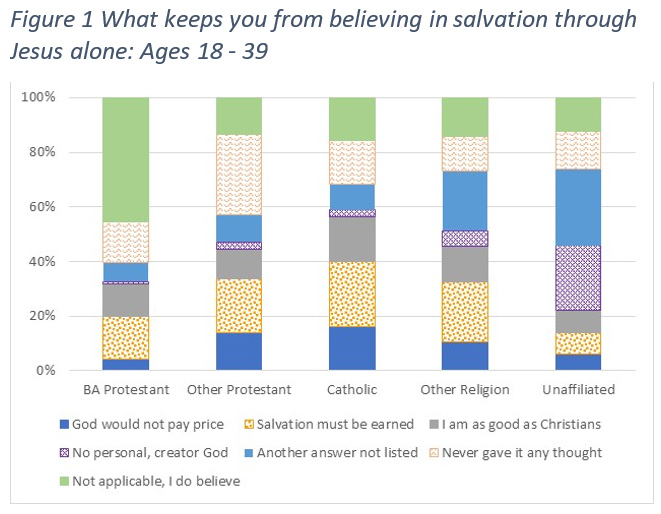
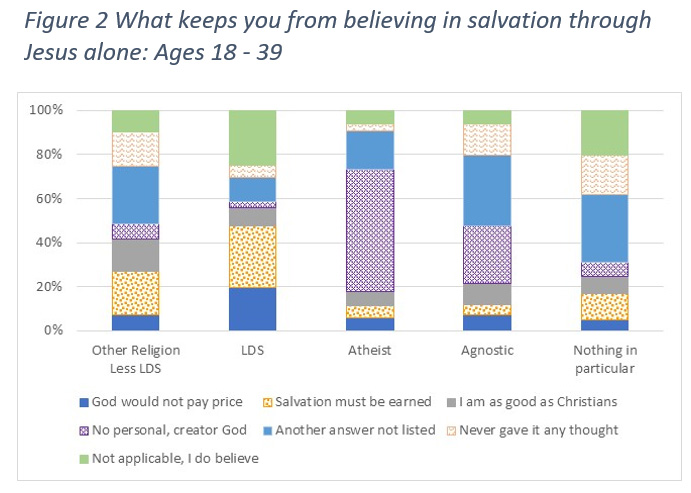 To get a better understanding of what drives these results, we dove further into the makeup of each of these two groups. The results are shown in Figure 2.{2} We divided Other Religions into the Latter Day Saints (Mormons) and all other non-Christian religions. We divided the Unaffiliated into Atheist, Agnostic and Nothing in Particular. As shown, the LDS respondents are much more likely than other religions to select “salvation must be earned,” “I do believe,” and “God would not pay the price.” Almost one quarter of the LDS selected “I do believe” which explains how the Other Religion category showed about 15% with that answer. So we see that a strong majority of LDS people believe that they must do something more than believing in Christ to achieve salvation. At the same time, a significant minority believe in salvation through faith in Christ alone.
To get a better understanding of what drives these results, we dove further into the makeup of each of these two groups. The results are shown in Figure 2.{2} We divided Other Religions into the Latter Day Saints (Mormons) and all other non-Christian religions. We divided the Unaffiliated into Atheist, Agnostic and Nothing in Particular. As shown, the LDS respondents are much more likely than other religions to select “salvation must be earned,” “I do believe,” and “God would not pay the price.” Almost one quarter of the LDS selected “I do believe” which explains how the Other Religion category showed about 15% with that answer. So we see that a strong majority of LDS people believe that they must do something more than believing in Christ to achieve salvation. At the same time, a significant minority believe in salvation through faith in Christ alone.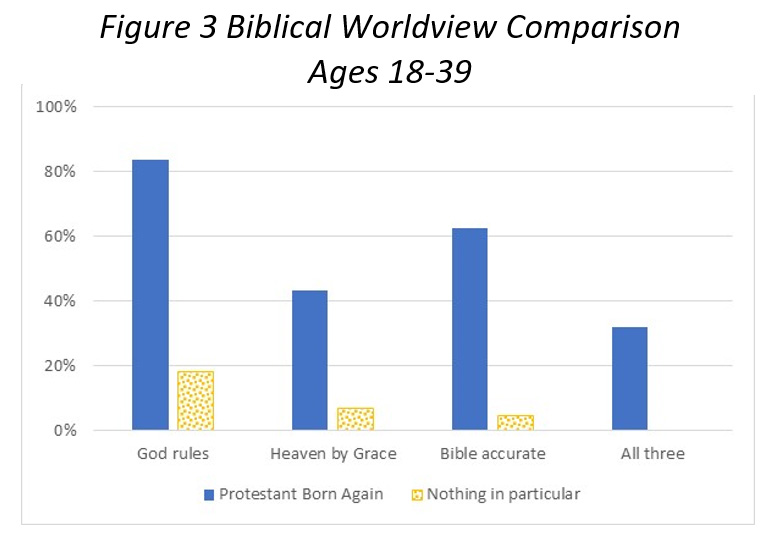 Let’s compare the results for Born-again Protestants and those who claimed to be Nothing in Particular. As shown in Figure 3, for each of the questions those agreeing with a biblical worldview among the Nothing in Particulars is a small fraction of those among Born-again Protestants. When we combine the three questions together, we see one out of three Born-again Protestants vs. no NIPs. Certainly, some of these NIPs came from an evangelical background, but none of them interviewed in our survey ascribe to a basic evangelical worldview as adults. As noted in our first report, one in three orn-again Protestants is a disappointing percentage ascribing to these biblical worldview questions, but it is certainly dramatically better than the Nothing in Particular group.
Let’s compare the results for Born-again Protestants and those who claimed to be Nothing in Particular. As shown in Figure 3, for each of the questions those agreeing with a biblical worldview among the Nothing in Particulars is a small fraction of those among Born-again Protestants. When we combine the three questions together, we see one out of three Born-again Protestants vs. no NIPs. Certainly, some of these NIPs came from an evangelical background, but none of them interviewed in our survey ascribe to a basic evangelical worldview as adults. As noted in our first report, one in three orn-again Protestants is a disappointing percentage ascribing to these biblical worldview questions, but it is certainly dramatically better than the Nothing in Particular group.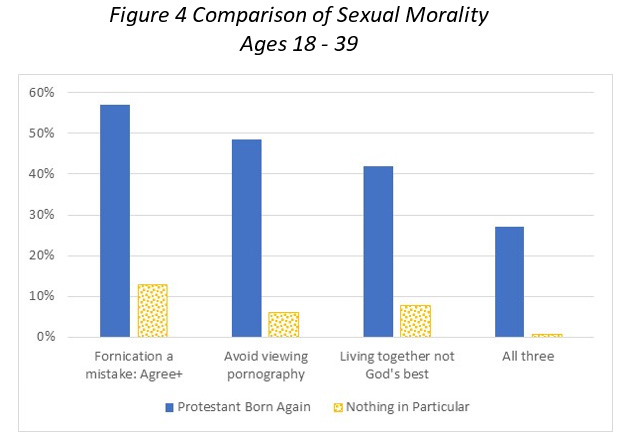 The results from our survey are shown in Figure 4. Once again, we see a large difference between these two groups. Clearly, the NIPs do not ascribe to a biblical view on sexual morality. The majority of Born-again Protestants do not ascribe to those beliefs either, but a significant minority of them do.
The results from our survey are shown in Figure 4. Once again, we see a large difference between these two groups. Clearly, the NIPs do not ascribe to a biblical view on sexual morality. The majority of Born-again Protestants do not ascribe to those beliefs either, but a significant minority of them do.
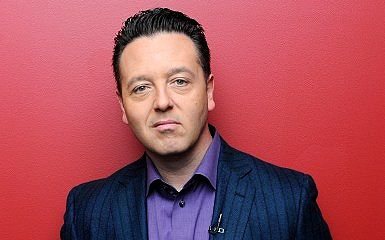 John Edward was 15 when he first learned of his life’s work.
John Edward was 15 when he first learned of his life’s work. The story of James Van Praagh is similar. On his Web site we learn that James was 24 when a medium told him that he would be in the same line of work within just two years.
The story of James Van Praagh is similar. On his Web site we learn that James was 24 when a medium told him that he would be in the same line of work within just two years.